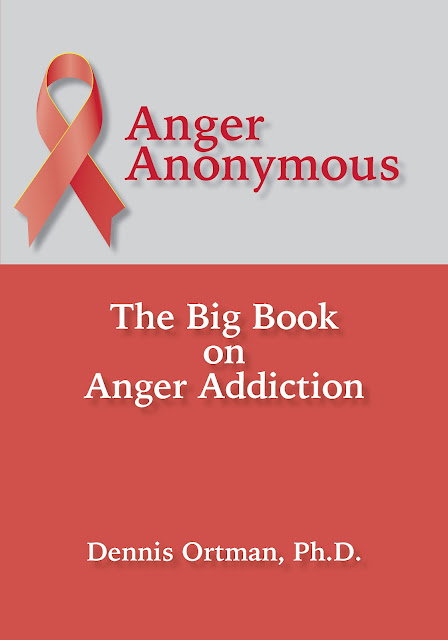Daily Excerpt: Anger Anonymous (Ortman): Anger As a Drug
Excerpt from Anger Anonymous
ANGER
AS A DRUG
Many label anger
a negative emotion because it can be as toxic as any drug. Indulged without
restraint, it causes untold wreckage to lives and relationships. When swallowed
out of fear, it becomes a poison. It seeps into the body, making you depressed,
nervous, and physically sick, and leaks out in passive-aggressive behavior.
I prefer to call
anger a difficult emotion because of the intensity of the energy it produces.
The problem with anger is not in the feeling itself, which is natural, but in
how it is expressed. It can be expressed beneficially in appropriately
assertive behavior and in protesting injustice. Problems occur, however, when
that energy is either under-controlled or over-controlled. Unchecked, it can
result in aggressive, harmful behavior that destroys people and relationships.
If internalized, it can wreak havoc with your body and emotions.
Anger is a
natural energy that helps you to survive when handled with care, compassion,
and wisdom. For example, if you feel bullied in a relationship, anger empowers
you to set limits. However, that energy can also be allowed to build up to
explosive levels and erupt in violent behavior towards yourself and others. You
may feel possessed by the demon anger and powerless to channel that energy in
wholesome ways. You become preoccupied with the wrongs done to you and dwell on
revenge. You doubt you can resist striking out at those who treated you
unfairly. Enemies appear everywhere as the anger takes over your psyche. When
your anger becomes excessive, you feel out of control.
The frequency of
road rage signals the overpowering presence of anger in our culture and in
ourselves. One woman related to me, “My daughter just started driving. I told
her to just look ahead at stop lights. If you make eye contact, you may invite
trouble.”
While there is
no formal diagnosis of an anger disorder, the hostile mood accompanies many
other clinical diagnoses. Nearly half of those who are depressed develop an
irritable mood. Depression has been described as “anger turned inward,” because
it often results in harsh self-criticism and suicidal violence. Many suffering
from anxiety lash out at others when their routines are upset or they are
forced out of their comfort zones. Eighty percent of those diagnosed with
bipolar disorder become irritable when manic. Aggressive behavior is also
frequent. Resentment is a driving force in addiction to alcohol and drugs. Many
alcoholics and drug addicts become angry and violent when under the influence
(1).
Even though you
may not be diagnosed with an anger disorder, you may believe you have an anger
sickness. The fire of rage may burn in you, and you feel powerless to
extinguish it. You may see yourself as a “rageholic” or “grudgeholic.” Your
anger may take on an addictive quality. You both love and hate being intoxicated
with it. One patient admitted to me, “My anger gives me a rush that exhilarates
me for a minute—and then it turns against me.” If you wonder if you are
addicted to anger, ask yourself the following questions:
·
Do you often feel overwhelmed by your aggressive
impulses and unable to control your temper?
·
Do you consider your anger excessive, even
crippling at times?
·
Do you feel a secret pleasure in the sense of
power your anger gives you?
·
Does your preoccupation with the unfairness of
life and being wronged interfere with your happiness?
·
Does your need for power and control seem
excessive, interfering with your relationships?
·
Has your life become unmanageable because of
your anger?
·
Do you feel hopeless about finding a cure for
your anger?
You may discover,
if you are honest with yourself, that you both love and hate your anger. On the
one hand, it gives you an adrenaline rush and you feel momentarily powerful.
You take pleasure in standing up for yourself, telling people off, or
intimidating others to do your bidding. Revenge can feel sweet. On the other
hand, after your aggressive displays, you feel shame and guilt for your
behavior. You hate being out of control. The broken relationships and the hurt
you cause those you love make you grieve. Anger can act like a stimulant drug
that energizes you and causes you to act insane. “Mad” and “madness” share the
same root word.
You may think of
addiction only as a chemical dependency on substances like alcohol, drugs, or
nicotine. You may even consider some compulsive behaviors, like gambling,
shopping, and over-eating or over-sexing, addictive. Nevertheless, mood states
and habits of thinking can also possess an addictive quality. For example,
anxiety, fear, and worry may act like a stimulant drug. You become preoccupied
with the dangers in life, worst-case scenarios, and a sense of helplessness, so
you withdraw from life into a safety zone. Sadness and a depressed mood may
simulate a sedative-hypnotic, causing you to sleepwalk through life. You focus
on past painful losses and disengage from the present. You can become stuck in
these moods and ways of thinking, powerless to extricate yourself (2).
As helpless as
you feel in the grip of anger and hatred, there is a way out. Your desperate
sense of hopelessness can be a prelude to new life.
Editor's note: Anger Anonymous provides the mechanism to achieve that new life., rage
Anger Anonymous earned the following awards:
BOOK OF THE YEAR FINALIST
KOPS-FETHERLING LEGACY AWARD IN PSYCHOLOGY
To read more posts, including book excerpts, about Dr. Dennis Ortman and his books, click HERE.
To read reviews of Anger Anonymous, click HERE.
To read more posts related to anger, click HERE.
Sign up for the MSI Press LLC newsletter
Follow MSI Press on Twitter, Face Book, and Instagram.





Comments
Post a Comment